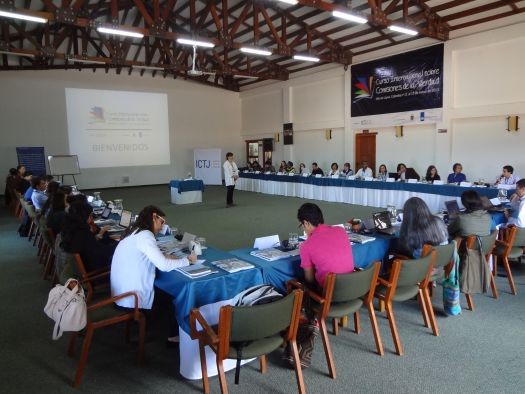María Camila Moreno, head of ICTJ's Colombia program, participants at ICTJ's International Course on Truth Commissions, in Villa de Leyva, Colombia, March 11, 2013,
Nearly a decade after Colombia’s first transitional justice mechanisms were created, the country is now weighing options for the establishment of an official truth commission.
To examine and inform these options, the International Center for Transitional Justice is hosting the International Course on Truth Commissions from March 11-15, 2013, in Villa de Leyva, Colombia. The course will be modeled after ICTJ’s international Intensive Course on Truth Commissions, which has been held for five consecutive years.
During the course, international experts who have worked on truth commissions will discussions on what a truth commission should be and how one could be created in Colombia. Course participants will include members of civil society organizations and government officials who can shape public policies on truth-seeking.
Colombia has not yet been able to guarantee citizens’ right to the truth, but is has made laudable efforts: signs of progress include the advances in legal truth obtained in the Justice and Peace Process, the creation of a truth mechanism in Law 1424 requiring accountability for demobilized paramilitary fighters who are not considered leaders, the reports by the Group and Center for Historical Memory, and local experiences of constructing truth and memory.
|
The most recent progression of the debate was reflected in the constitutional reform passed in mid-2012, known as the Legal Framework for Peace, which authorizes Congress to create a truth commission as a complementary mechanism for providing accountability. |
“This will not be an easy issue to deal with, since there are different interpretations in Colombia of what a truth commission should be and what it should do,” said María Camila Moreno, director of ICTJ Colombia. “Because there is a wide range of opinions, it’s essential to lay a solid conceptual foundation for the future truth commission, which would start out by defining clear objectives.”
According to Eduardo Gonzalez, director of ICTJ’s Truth and Memory Program, a truth and memory exercise that is done properly, in a democratic way that opens dialogue, can help accurately identify structural factors that lead to violence. But this exercise cannot be limited to merely describing the facts; rather, it must involve the reconstruction of overall patterns and historical contexts, and provide comprehensive reports that can inform public policy options.
ICTJ’s truth commissions course—which is being held with the support of Sweden and the Embassy of the Kingdom of the Netherlands—will provide a comparative analysis, drawing on the conclusions and reflections of truth commissions whose work has been recognized as emblematic.
Special attention will be devoted to the transition in South Africa, a textbook case which has recently been questioned because of its shortcomings as regards accountability and reparation. ICTJ’s senior program adviser Howard Varney, who worked for the Truth and Reconciliation Commission in South Africa, will lead a discussion of the problems, challenges and goals of that experience.
The course will also explore a differential focus which should be taken into account in the strategic planning of a truth commission.
Thus, it will discuss how to guarantee a gender perspective on specific areas of the commission’s mandate; how to ensure the participation of girls and boys in the implementation of this mandate; how to incorporate an indigenous perspective in conceptualizing truth-seeking, and how to pay special attention to violations committed against those groups. Dealing with these topics will be ICTJ experts Kelli Muddell, director of ICTJ’s Gender Justice program, and Virginie Ladisch, head of ICTJ’s Children and Youth program.
Learn more: In ICTJ's film "Voices of Dignity," meet Yoladis and Petronila, two women in Colombia who are fighting for their rights.
